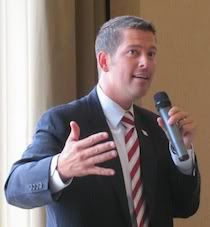I’m sorry that it’s been a while since I did one of these. Outside the outliers of the St. Norbert’s Senate poll and various Democrat-sponsored internal polls, not much had really changed in the aggregate since the end of September until now. To make up for that lack of attention, I’ll expand the look to cover the two Congressional races in the northern part of the state, the 7th and 8th Congressional Districts.
Before I really begin, I may as well explain why I’m completely discounting the St. Norbert’s polls, even though their gubernatorial poll appeared to confirm what everybody else has. They have a long, bipartisan history of being outliers, likely due to the extended length of time covered by the polls and the fact that it’s conducted by college students just learning how to do polling.
Senate/Gubernatorial polls
First up for review in both the gubernatorial and Senate races is the Reuters/Ipsos poll (crosstabs courtesy RealCleaPolitics), taken between 10/8 and 10/11 among 600 registered and 451 likely voters. On the likely-voter end, Republican nominee Ron Johnson had a 51%-44% lead on Democrat incumbent Russ Feingold in the Senate race, and Republican nominee Scott Walker had a 52%-42% lead on Democrat nominee Tom Barrett in the gubernatorial race. On the registered-voter end, Johnson’s lead almost completely evaporated to 46%-45%, while Walker’s lead shrunk by less to a 48%-41% lead. Of note in this poll is the partisan split; while the registered voter partisan split was 46% Democrat-38% Republican, the likely voter partisan split was 45% Republican-42% Democrat.
Ipsos did not break down the likely-voter numbers by party. Among the 9% of registered voters who identified themselves as independents in this poll, Johnson had a 38%-30% lead, with a significant part of Feingold’s support coming from those who were merely “leaning” toward him (the “firm-committment” numbers were 37%-25% in favor of Johnson). Meanwhile, Walker had a 41%-15% lead among the independents with leaners and a 36%-15% lead among independents who expressed a “firm committment”.
Next up is the Time/CNN/Opinion Research poll, taken between 10/8 and 10/12 among 931 likely voters. Johnson and Walker both had identical 52%-44% leads over Feingold and Barrett respectively. While the partisan split was not released, based on the margin of error, independents were a substantial plurality, while Republicans and Democrats were roughly equal in representation. Both Johnson and Walker had roughly 20-point leads among independents.
Finally, the Rasmussen polls taken on 10/25 among 750 likely voters. Johnson had a 53%-46% lead on Feingold, while Walker had a 52%-42% lead on Barrett. Democrats had a 39%-37% advantage in the poll over Republicans, but Johnson held a 21-point advantage and Walker held a 27-point advantage among independents.
Going back over the numbers from RealClearPolitics, in the Senate race, outside the St. Norbert outlier, Johnson has been above 50% since the September primaries and Feingold has been at or under 46% against Johnson since polling started including him in May. On the gubernatorial side, outside of a late-September Fox News/Pulse Opinion Research poll, Walker has been at or above 50% since the primaries, while Barrett has been at or below 45% for the entire year including that Fox News/Pulse Opinion Research poll.
Revisions/extensions (1:34 pm 10/29/2010) – I should have procrastinated a bit longer because Public Policy Polling released a poll this morning with Johnson and Walker holding identical 53%-44% leads. Fuller discussion is above.
8th Congressional District
Publicly-available polling has been rather sparse in this district, with only two polls that RealClearPolitics noted, one from The Hill/Penn, Schoen and Berland taken between 10/12 and 10/14 among 415 likely voters and one from DailyKos/Public Policy Polling taken between 10/23 and 10/24 among 1,419 likely voters.
In The Hill’s poll, Republican nominee Reid Ribble had a 45%-44% lead on Democrat incumbent Steve Kagen. There were two items in the crosstabs (courtesy WisPolitics’ DC Wrap) that do not match up with most other polls taken nationwide; the partisan split, and the independent voter result. The split was listed as 38% independent-32% Republican-25% Democrat, while Kagen held a 3-point lead among independents.
The DailyKos poll is far more interesting, not the least of which is the size of the poll. Ribble had a 40%-37% lead on Kagen, with 23% undecided. Meanwhile, Johnson had a 52%-45% lead on Feingold in the district, while Walker had a 52%-44% lead on Barrett.
The demographic percentages at the bottom of the crosstabs seem to have been fouled up, but the partisan split appears to be roughly 38% independent, 31% Democrat and 30% Republican. Among independents, Ribble had a 41%-31% lead, while Johnson had a 16-point lead and Walker a 18-point lead among those same independents.
7th Congressional District
Like the 8th Congressional, publicly-available polling is hard to come by, with the added handicap of no crosstabs from the two outfits that polled the district. The Hill/Penn, Schoen and Berland polled 400 likely voters between 10/2 and 10/7, and found Republican nominee Sean Duffy up on Democrat nominee Julie Lassa 44%-35%. The Hill noted Duffy held a 17-point lead among independents (no partisan split given) and a 2-point lead among women, with Lassa’s only demographic lead being among voters over 55 years old.
An outfit called We Ask America polled 1,150 registered voters on 10/18. They found Duffy up 46.00%-38.61% (yes, they reported to the nearest hundredth of a percent), a bit of a tightening from their 8/4 poll of 1,002 registered voters that had Duffy up 41.83%-33.09%. The partisan split was 39% independent-32% Democrat-29% Republican, and Duffy held a 49.10%-29.95% lead among independents.
